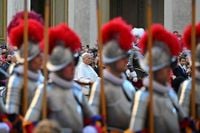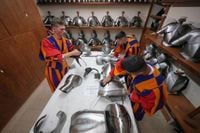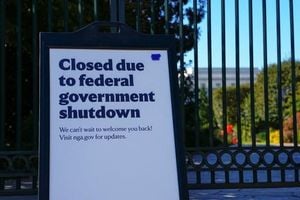In a striking blend of tradition and modern spectacle, Pope Leo XIV presided over the swearing-in ceremony of 27 new Swiss Guards on October 4, 2025, at the Apostolic Palace in Vatican City. The event, steeped in history and ceremonial grandeur, marked the first time since 1968 that a reigning pope personally led the induction of new members into what is widely recognized as the world’s oldest standing army.
The Swiss Guards, instantly recognizable in their vibrant yellow, blue, and red gala uniforms, once again pledged their loyalty to the pontiff, vowing, as they have for centuries, to defend him with all their strength—and, if necessary, with their lives. The ceremony, traditionally held on May 6 to commemorate the 1527 Sack of Rome when 147 guardsmen died protecting Pope Clement VII, was postponed this year due to the death of Pope Francis in April and the subsequent conclave that brought Leo XIV to the papacy, according to the Associated Press.
The San Damaso Courtyard of the Apostolic Palace was transformed for the occasion. Flags of the Swiss Cantons fluttered in the late afternoon breeze, and dignitaries including Swiss President Karin Keller-Sutter, cardinals, clergy, civil and military officials, and families of the new guards filled the space. The event began with a slow-motion procession of senior guards, their halberds gleaming and red-feathered helmets catching the light, to the staccato rhythm of drums. Each of the 27 recruits, armor shining over their uniforms, was called forward individually by the Swiss Guards sergeant major to grasp the Corps’ flag and pronounce the oath.
“To all of you who have made this oath: it is a very important witness in today’s world,” Pope Leo XIV told the assembled guards, their families, and guests, as quoted by Vatican News. “It shows us the value of discipline, of sacrifice, of living the faith in a way that truly speaks to young people—about the value of giving one’s life, of serving and thinking of others. I thank you in my name and on behalf of the entire Holy See for your service.”
The chaplain of the Swiss Guard reinforced the gravity of the moment, addressing the new recruits: “We are proud of you, and grateful that you have responded to the call to this honourable service, which you now swear to carry out conscientiously and faithfully.” He then led them in the traditional oath: “I swear to serve faithfully, loyally and honourably the Supreme Pontiff Leo XIV and his legitimate successors, and to dedicate myself to them with all my strength, even sacrificing my life if necessary for their defence. I also assume these obligations toward the College of Cardinals during the time of a vacant See. I furthermore promise respect, loyalty and obedience to the Commander and my other superiors. I swear it. So help me God and our Holy Patrons.”
The ceremony, lasting just over an hour, concluded with a short concert by the Swiss Guard band, which delighted the crowd with a rendition of Toto’s “Africa”—a surprising and crowd-pleasing choice that injected a note of modernity into the centuries-old tradition.
Founded in 1506 by Pope Giulio II, the Pontifical Swiss Guard traces its origins to the bravery of Swiss mercenaries who, legend has it, so impressed the Vatican that they were asked to defend its walls. Over 500 years later, the Swiss continue to supply soldiers to the Vatican, keeping the force at around 135 men. Their duties remain largely unchanged: guarding the main entrances to Vatican City, providing ceremonial honor at papal events, and offering personal protection to the pope. Day-to-day policing and the pope’s main bodyguard detail, however, are handled by the Vatican’s gendarmerie—Italian law enforcement officers who bring their own experience and training to the microstate’s security apparatus.
Entry into the Swiss Guard is no small feat. The criteria are strict: candidates must be unmarried Swiss males aged 19 to 30, practicing Catholics, at least 1.74 meters (about 5-foot-7) tall, and possess an impeccable reputation. Each recruit must also have completed Swiss military training and commit to serving in Rome for at least 26 months. For those aged 25 and older, marriage is permitted—but only after five years of service and a pledge to remain for an additional three years. Life in the barracks is disciplined, with a curfew and limited night outings, making the role a significant personal sacrifice.
Recruitment, not surprisingly, can be a challenge. As Corp. Eliah Cinotti, the corps’ spokesman, explained to reporters, “But that doesn’t mean we don’t have to continue to recruit, recruit.” Still, the 27 new recruits for 2025-2026 represent a stable intake, buoyed by increased interest during the Holy Year. According to Cinotti, the corps has adapted to Pope Leo XIV’s new style, noting the need for heightened vigilance as the pope’s public appearances have drawn more unpredictable crowds. Leo, an avid tennis player known for his quick reflexes, has already demonstrated his ability to handle unexpected situations, having caught objects—ranging from stuffed animals to tennis balls—thrown his way during recent outings on the popemobile.
Despite the ceremonial splendor and historic resonance, the Swiss Guard faces practical challenges. The corps’ barracks, described as cramped and outdated, are slated for renovation, with a major fundraising campaign planned for 2026. The guards are also in the midst of a publicity push, unveiling new uniforms designed for formal occasions in hopes of attracting fresh recruits and modernizing the force’s image.
As the Vatican’s Swiss Guards continue to balance the weight of tradition with the demands of the present, the 2025 swearing-in ceremony stood as a vivid reminder of both their enduring legacy and the evolving realities of their service. The presence of the pope himself—breaking with nearly six decades of precedent—lent the event a sense of renewal and relevance, underscoring the ongoing importance of faith, sacrifice, and duty in a rapidly changing world.
With the Vatican’s ancient courtyards once again echoing with the sound of pledges, anthems, and applause, the Swiss Guard’s story enters its next chapter—rooted in history, but ever responsive to the challenges of the times.






